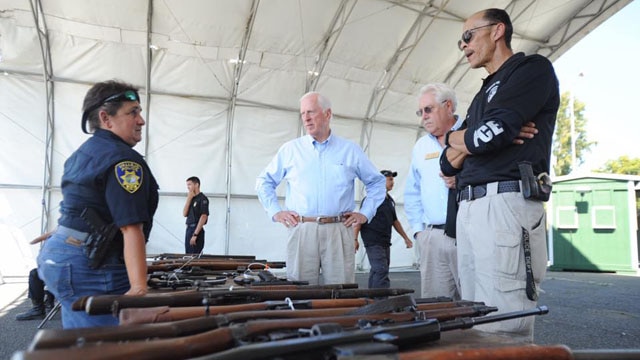
California Democrat Rep. Mike Thompson, chairman of the House Gun Violence Prevention Task Force, pictured center, wants to encourage states to get tougher about gun regulations related to mental health issues. (Photo: Congressman Mike Thompson/Facebook)
A new bill introduced last week aims to strengthen the federal government’s ability to keep guns out of the wrong hands — and it needs states’ help to do it.
The Safer Communities Act of 2017 — a joint effort sponsored by California Democratic Congressmen Mike Thompson and Ed Perlmutter — would expand and clarify existing categories of prohibited gun owners, extending the ban to include involuntary outpatient commitment.
The proposal also offers states grant money to enact gun violence prevention legislation — such as laws granting courts the ability to temporarily revoke ownership rights from a person suspected of harming themselves or others — and encourages states to bolster its submissions of disqualifying records to the National Instant Criminal Background Check System.
“After nearly every gun violence tragedy, we’ve heard many say that guns are not the problem, mental health is. The Safer Communities Act we’ve introduced today would address that problem and keep guns out of the hands of the dangerously mentally ill,” Thompson said Thursday. “While those suffering from mental illness are far more likely to be victims than perpetrators of violent crimes, we recognize that improving our mental health system, and keeping firearms from those with other risk factors such as a history of substance abuse disorders and violence, can help prevent gun violence.”
The proposal mandates the FBI upgrade its alert system so state and federal law enforcement can pursue cases where prohibited persons attempt to buy guns. The term “mentally defective” found in existing statute would also be replaced with “ineligible due to disqualifying mental status.”
“This is a common sense proposal to reduce the likelihood of individuals suffering from mental illness from accessing firearms,” Perlmutter said. “It’s important to keep guns away from individuals who pose a threat to themselves or others and instead provide them with the mental health services they need. We’ve seen far too many tragedies in our communities and we must take steps to prevent future tragedies by making gun violence less easy, less frequent and less deadly.”
More than 1.6 million disqualifying records were added into the federal background check system index in 2016, according to a report released earlier this year. Kimberly J. Del Greco, section chief of NICS, said multiple agencies provided 1,650,428 criminal records to the government, giving federal agents the information necessary to deny more than 120,000 firearm transfers.
“As the NICS Section moves forward with the future development of NICS, we are committed to consistently providing its users and the citizens of the United States with a highly effective and efficient level of quality service in the furtherance of public safety and national security,” Del Greco said in the 2016 NICS Operational report.
Nearly 41 percent of the denials last year comprised applicants convicted a crime punishable by more than one year in prison — or two years for a misdemeanor. Another 20 percent of applicants were denied as “fugitives from justice.”
About 9 percent of denial in 2016 were related to substance abuse — slightly higher than the 8 percent denial rate recorded in NICS’s 19-year history.
Some 5,638 denials were issued based on mental health records, according the report, or about 4.6 percent of the total applications denied in 2016. The rate is low in comparison to the system’s 19 percent denial rate overall for those adjudicated mentally ill.
It’s the disqualifying category that draws the arguably most ire — politically — for its perceived role in preventing mass shootings.
Congress approved the Brady Handgun Violence Prevention Act in 1994 and since then more than 257 million background checks have been processed through NICS.
State and federal attempts to expand the background check system have thus far focused on which type of sales to regulate or how long to mandate waiting periods when applications fall into pending status. Supporters of the various measures say subjecting private transfers to background checks will keep guns out of the hands of criminals, while longer waiting periods afford the FBI more time to investigate red flags turned up in the background check process.
Gun groups, however, say lengthening waiting periods or casting a wider net on sales doesn’t address the true issue with NICS — shoddy record keeping at the local level and an unwillingness from certain states to upload disqualifying documents into NICS.
The National Shooting Sports Foundation takes the middle ground on the issue, spearheading a years-long effort to improve the federal records system with a campaign called “Fix NICS.”
Since kicking off its campaign five years ago, the numbers of disqualifying records uploaded to NICS increased 170 percent. Legislation passed in 16 states boosted the number of records provided to NICS from 1.6 million in 2012 to almost 4.5 million in 2016.
“This significant increase is driven by states like Pennsylvania, which now has 794,589 records, compared to one in 2012,” NSSF Senior Vice President and General Counsel Larry Keane said. “New Jersey, another FixNICS success story, has now submitted 431,543 records, up from 17 in 2012, and is now ranked as the second best state on a per capita basis.”
Thompson and Perlmutter serve as the two highest ranking members of the House Gun Violence Prevention Task Force, convened in the weeks after the December 2012 Sandy Hook shooting. The proposal, introduced as H.R. 4142 Thursday, awaits consideration.
The post Safer Communities Act aims to bolster NICS submissions appeared first on Guns.com.
